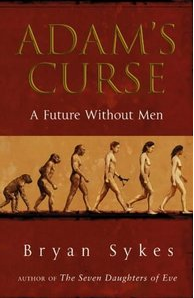| Adam’s Curse – Bryan Sykes, OUP Firstly this isn’t a new book, as it was first published in 2003, but one that I have recently read. I remembered it from the day I went to buy a ‘popular science book’ to read and then talk about in my Cambridge interview, I saw this book but decided to get something else from Blackwells. However, I now think I made a big mistake that day for two reasons. The first is that a large section of the book deals with the history of genetics and the discoveries made. This would have been very useful, as this would have helped greatly in my Biology of Cells course. I found this section really interesting, as it helps you to understand the scientific method and how things that are held as scientific orthodoxy can at some point in the future seem absurd (in the book Sykes mentions the miscounting of the human chromosomes). For me this was a nice trip down memory lane, but for people not versed in genetics it is well written and accessible. The second reason that I wish I had read it was the way it introduces sexual conflict. This was something that, in the UK at least, is not even touched upon. I had to wait until the first year of undergrad to be introduced to this amazing insight into evolution: that males and females have competing aims and are therefore locked into an eternal (or not if you believe Sykes conclusions) struggle for reproductive success. All of this conflict is driven by sex and the consequences of it. And this is the area of biology I now work in. In the book Sykes outlines how his study of the Y chromosome (transferred down the male line) has unearthed a vastly different genetic history to that of the mitochondria (transferred down the female line). These histories reflect the conflict between them, with the Y chromosome and mitochondria favouring their own reproduction. He has interesting examples of families with sex biased reproduction, hinting at Y chromosomes that may have hit upon the ability to perpetuate their own survival at the cost of the mitochondria and vice versa. Sykes also shows a nice link between surnames and actual relatedness, with MacDonalds and Sykes the world over have a storng chance of being related to each other down the male line. I do however not agree with his closing argument; that due to a lack of recombination and a high mutation rate, due to sperm going through far more cell cycles than mitochondria, that the Y chromosome is doomed and therefore so are men (and potentially humanity). I have two grounds for my disagreement. Firstly, Skyes makes a big deal about falling sperm counts, but a recent paper I have read has cast a great of doubt on whether sperm counts are actually falling. Secondly, there are many species with similar mating systems to human and who would therefore be experiencing the same problems, yet they appear to be doing just fine. But even if I am wrong and Sykes is right, he still gives humanity about 125,000 years! He did skip over one potential interesting point; with sperm going through far more cell cycles than eggs, mutation rate in men must therefore be much higher – therefore could males of a species offer up the variation upon which selection acts and therefore be the drivers of evolution? http://en.wikipedia.org/wiki/Adam's_Curse |
|
0 Comments
Leave a Reply. |
AuthorI am a behavioural ecologist, my main interests revolve around familial conflicts and their resolutions. However, my scientific interests are fairly broad. Archives
October 2016
Categories
All
|


 RSS Feed
RSS Feed
